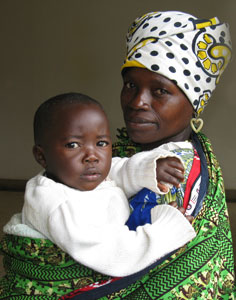Hope motivates positive behavior in HIV patients
July / August 2014 | Volume 13, Issue 4

Photo by Virginia Lamprecht/Photoshare
Counseling that encourages hope in
people living with HIV may improve their
adherence to antiretroviral drugs.
Hope can be a powerful positive force in the lives of people living with HIV, not only on a personal level by encouraging them to plan for the future, but also at a societal level by spurring treatment adherence and thwarting transmission of the virus, according to a Fogarty-funded study in Tanzania.
Although antiretroviral (ARVs) drugs are allowing millions of HIV-positive people to live normal lives, a new diagnosis of HIV can often lead to depression, research has shown, making it less likely some will seek or adhere to treatment regimens.
"Without appropriate interventions to address mental health comorbidities, people living with HIV may continue to have poor quality of life despite increased access to ARVs globally," the team of scientists wrote in their recently published paper. "Clinic-based HIV counseling support can promote more hope and positive behaviors," they added.
The researchers investigated how residents of Dar es Salaam who are living with HIV perceive hope and process the information that an HIV diagnosis does not mean immediate death. "This knowledge leads to positive emotions and motivation to seek treatment and cope," the scientists observed.
Tanzania is one of the countries hardest hit by the HIV epidemic, with about 1.5 million people living with HIV, according to UNAIDS data. But the prevalence is declining, measured at 5.1 percent of the population in 2011-2012, compared with 7.0 percent in 2003-2004.
The qualitative study - published in the Journal of the International Association of Providers of AIDS Care - included focus group discussions with 78 people who had been HIV-positive for at least six months and interviews with others who had a recent depression diagnosis or whose hospital records gave depression as the reason for missed clinical visits.
Participants conveyed their experiences of hope in three ways - involving emotions, cognitive approaches, and coping or normalization. They described joy as an emotion of happiness, security and relief. On the cognitive front, hope was equated with positive thoughts of a good future and long life. Meanwhile, on the theme of coping and normalization, hope indicated acceptance of HIV-positive status, and willingness to seek and adhere to medical care and contemplate future plans.
Hope levels were high in patients who had been ill and then improved upon taking antiretrovirals, as well as in those who learned that treatment offered the prospect of longevity and a normal lifestyle. One study participant said, "Hope is what lifted me up when I was not sure of continuing with my life anymore."
The study is part of a research training project supported by a five-year Fogarty grant to Muhimbili University of Health and Allied Sciences, in collaboration with Harvard School of Public Health and other partners. The initiative, now known as the Fogarty HIV Research Training Program, encourages training in low- and middle-income countries in skills needed to conduct clinical research and implementation science, including operations and health services research.
The investigators noted some people living with HIV found it harder to muster a positive attitude, especially those facing social alienation, battling opportunistic infections or suffering side effects from antiretrovirals.
The researchers concluded that helping HIV-positive people develop and maintain hope can be an important aspect of care, not least in reversing poor adherence to treatment and high loss of follow-up. Hope "stimulated inner strength, which acted as a drive to cope and normalize their lives," the authors wrote. "The findings point to a possibility of positive benefits of promoting aspects of hope among people living with HIV."
More Information
To view Adobe PDF files,
download current, free accessible plug-ins from Adobe's website.